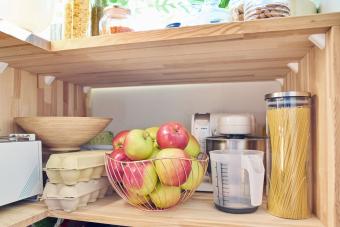
It's apple season, and your kitchen runneth over with this sweet, juicy fruit. Fortunately, there are plenty of ways to keep this goodness going for months to come, with proper planning and storage. Discover what you need to know to be able to enjoy delicious apples well into winter, and even beyond.
How to Store Apples for up to a Month
Do you have more fresh apples than you can eat in a week or so? Whether your apples are fresh from an orchard or if you bought them at a supermarket, you can easily get them to last for a month with proper storage.

- Refrigerator storage: Storing apples in your refrigerator's crisper will help keep them fresh for up to four weeks. For the best results, put them in a plastic bag with ventilation holes poked in, then place the bag in the crisper.
- Dry storage: Refrigerator too full? Not to worry. Apples don't actually require refrigeration. Uncut apples will keep for up to a month if you place them on a shelf in a cool, dry place such as a pantry, cupboard, or closet.
No matter which option you choose, your apples will stay fresh longer than if you just leave them in a fruit basket on the counter.
How to Store Apples Over the Winter
Want to store apples even longer? It's possible to store fresh apples throughout winter with just a bit more care. If long-term storage is your goal, you'll need to select your apples carefully and take some special precautions.

- Apple variety: Choose a firm-fleshed apple with thick skin, like Granny Smith, Pink Lady, or Winesap. Avoid soft varieties with thin skins (such as Golden Delicious), as they do not store well.
- Fruit size: Variety isn't the whole story. Smaller apples tend to store better than larger ones, so set aside the smallest fruit you pick or purchase for long-term storage.
- Ripeness: Pick the apples that you plan to store after they reach maturity, but before they are fully ripe. They should still be a bit tart, and they should be a bit lighter than when completely ripe.
- Fruit quality: For long-term storage, use only firm apples that are free from blemishes. If you come across damaged apples, set them aside for fresh eating or to use in recipes.
- Wrap and seal: Wrap apples individually in newspaper strips, then place them in plastic containers that have an airtight lid. (The newspaper keeps the apples from touching each other, which keeps them fresh longer.)
- Cold storage: Store the closed containers in the refrigerator crisper or in a dry, cool (but not freezing) place, such as a shed, garage, barn, or basement. The ideal temperature is between 35 and 40 degrees Fahrenheit.
Apples stored this way can generally last for up to five months. In some cases, they may last longer. If the temperature drops below freezing, the texture will change, and you'll need to preserve them another way.
How to Store Apples in the Freezer
Plan to use your apples in recipes rather than eating them whole? In that case, you can store them in the freezer. Freezing changes the texture of apples, so don't store them this way for fresh eating.

- Whole apples: To store uncut apples in the freezer, simply seal them inside airtight freezer bags. To easily remove a few apples at a time, freeze the apples individually before bagging them. This way, they won't stick together.
- Cut apples: You may want to core, peel, and slice or chop your apples before freezing so they can go directly into recipes. In this case, toss the cut-up apples in lemon juice before you freeze them to prevent browning.
When you store apples in your freezer, you'll have easy access to the makings of apple pie, apple crisp, applesauce, apple butter, and all of your other favorite apple recipes. Frozen apples will keep this way for up to 18 months.
Key Apple Storage Tips
Boost your chances of successful apple storage by following a few key tips. The tips below apply for both short-term and long-term apple storage.
- Nobody wants to bite into an apple that tastes like onion or garlic. Because apples may absorb the flavors, you should avoid storing them near foods that have strong odors.
- Potatoes don't have strong odors, but you still shouldn't store apples near them. If you do, both your potatoes and your apples will go bad faster than they would have otherwise.
- If whole apples you are storing start to lose their freshness, don't throw them away. Simply transfer them to freezer storage, then use them in recipes in the coming months.
Enjoy Apple Deliciousness in Every Season
Whether you have your own apple trees or if there's a you-pick orchard nearby, you now know how to make the most of your harvest. Use the techniques above to keep your apples tasting great and you'll be able to enjoy delicious apple flavor all year long.







